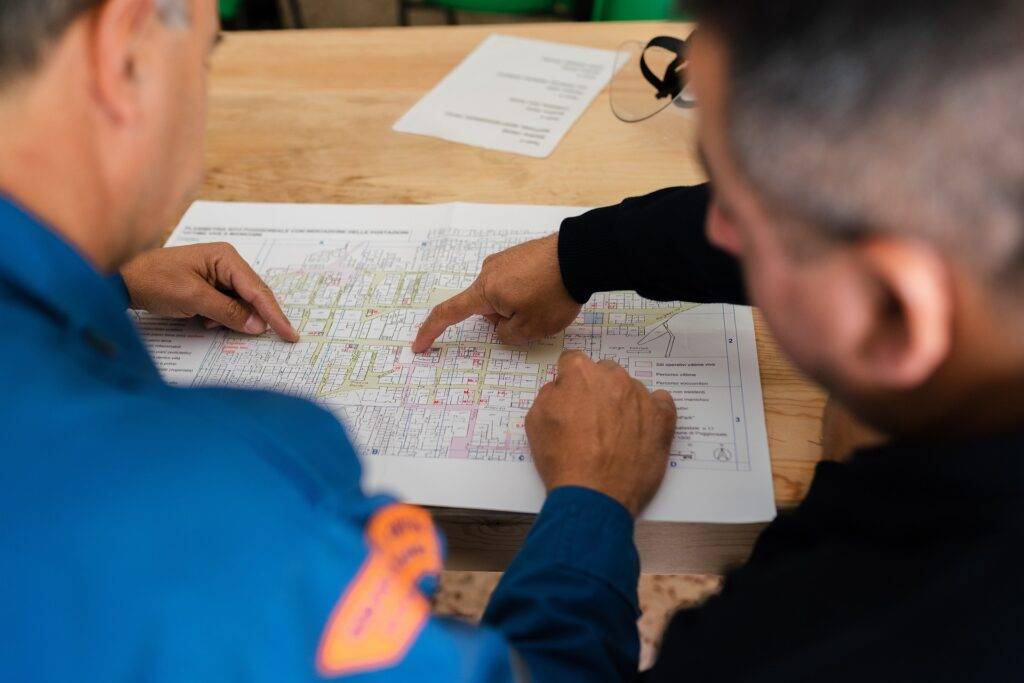Career Pathways in Net-Zero Energy
Guidance on the variety of opportunities involved in supporting the transformation of the region’s energy sector.

Welcome to your comprehensive guide on career pathways into the growing field of net-zero energy. Whether you’re a novice looking to start a new career or a professional keen to upskill, this guide offers a clear roadmap to a rewarding career in helping the region's energy sector transition to build a sustainable future.
What is Net-Zero Energy?
The net-zero energy sector is an exciting field focused on reducing greenhouse gas emissions from energy production and consumption. Achieving net-zero means balancing total emissions produced with those removed from the atmosphere, making it essential for our planet’s future. This sector includes innovative technologies and strategies aimed at decarbonising energy systems.
Careers such as renewable energy engineers, solar panel installers, construction workers and welders lead the way in areas like solar, wind, heat networks, carbon capture, and energy-efficient building design. Additionally, non-technical roles like project managers, policy advisors, and communications professionals support project success, shape supportive policies, and drive the growth of clean energy solutions. If you’re passionate about sustainability and want to make a difference, the net-zero energy sector offers a rewarding career path.
The net-zero energy sector is at the heart of the government's plans to transition to a fully decarbonised electricity system by 2035. This dynamic industry is rapidly expanding renewable energy sources, such as onshore wind and solar photovoltaics (PV), and is driving demand for a new generation of skilled professionals. From designing district heat networks to installing cutting-edge renewable technologies, the sector offers diverse, rewarding career opportunities for those ready to make an impact.
In the West of England Combined Authority, decarbonising our energy system is key to achieving our commitment to net-zero by 2030. This effort is opening up a wide range of roles across the renewable energy sector, from community engagement to grid infrastructure coordination. Whether you're passionate about sustainability, skilled in project management, or technically minded, there’s a role for you in shaping a greener future.

Why work in the Net-Zero Energy sector?
You could work outdoors on land or at sea, in an office or in a laboratory. Many roles provide opportunities to travel and work across the globe.
You will make a meaningful impact by being part of the solution to climate change, ensuring a healthier planet for future generations.
It's a rapidly evolving field driven by technological advancements and regulatory changes, allowing you to work on cutting-edge projects and implement transformative solutions.
There is increasing demand for clean energy, which will increase job security and numerous opportunities for career development in the future.
You'll be helping to address fuel poverty by supporting a transition to renewable energy.
How to find the right course for you
If you are looking to start afresh in the net-zero energy sector, work experience, apprenticeships and technical education are all good routes to exploring new careers.
Option 1: University and Degree Apprenticeships
- Eligibility: 18+
Cost: Loans available to cover study. In case of degree apprenticeships, learners are paid (rates of pay vary)
Length: Varies depending on level and subject area but typically 3-5 years.
Benefits: Gain an in-depth knowledge and understanding of issues in this sector and network with professionals.
You can explore the variety of courses available on UCAS.
Option 2: Apprenticeships and Technical Education:
- Eligibility: 16+
Cost: Free. In case of apprenticeships, learners are paid (rates of pay vary)
Length: Varies depending on level and subject area but typically 1-5 years.
Benefits: Combines real work with training and study, where you get to put skills into practice.
You can explore the variety of courses, apprenticeships and technical education on the IfATE Occupational Maps. For local support and guidance, contact the Western Training Provider Network.
Option 3: Work Experience:
Arranging a work experience placement is a great way to get a sense of the industry as well as build skills, gain experience and grow your network.
Professional organisations supporting different industries often provide advice on gaining work experience (look for links to ‘Professional and Industry Bodies’ at the bottom of this page)
If you have experience in a relevant role such as in construction and want to widen your skillset to include opportunities in net-zero energy, there are lots of short courses available to you. Below are some examples of common types of training.
Option 1: Skills Bootcamps
- Eligibility: 19 years+
- Cost: Free
- Length: up to 16 weeks (part-time/flexible courses to help fit around commitments)
- Benefits: Great for upskilling and/or broadening your skillset to support progressing your work opportunities, often a fast-track to an interview.
Search for a relevant bootcamp, or read the stories of others who have completed them.
Option 2: Further Training or Continual Professional Development (CPD)
- Eligibility: Various
- Cost: Various
- Length: As little as a few hours, up to weeks or months depending on the subject.
- Benefits: Great for keeping up-to-date on industry standards and developments, and developing new skills.
You can also contact our Skills Connect Advisors who are happy to talk through the different options available to you
Specialist areas in Net-Zero Energy
Electricians and electrical engineers supporting the design and installation of various energy systems play a key role in the sector. For more information about careers in electrical industry, head to our electrical skills pages which explain how to move into and upskill in fitting Solar PV, Energy Storage and electric vehicle charging.
To find out which training providers in the region are offering local training opportunities in areas of Net Zero Energy, head to the Skills Connect Directory.
Welding and construction jobs are vital in the net-zero energy sector as they help to develop crucial renewable energy infrastructure, such as solar farms and wind turbine installations. Skilled welders also play a key role in retrofitting buildings for energy efficiency and ensuring that renewable technologies operate safely.
To find out which training providers in the region are offering local training opportunities in areas of Climate Resilience, head to the Skills Connect Directory.
Engineering jobs in the net-zero energy sector offer a variety of exciting opportunities. Renewable energy engineers create technologies that harness solar, wind, and hydrogen energy. Energy efficiency engineers design systems that use less energy and reduce carbon footprints. Environmental engineers tackle projects that capture carbon and produce hydrogen safely, ensuring new energy solutions support a sustainable future. Visit the This is Engineering website for more careers information.
To find out which training providers in the region are offering local training opportunities in areas of Climate Resilience, head to the Skills Connect Directory.
Jobs in community energy scheme development focus on creating and implementing local renewable energy projects that empower communities and promote sustainability. Key roles include community energy coordinators, project managers, renewable energy consultants, and outreach specialists, all working together to engage residents, secure funding, and design effective energy solutions. These positions are essential for helping communities take control of their energy needs and contribute to a low-carbon future.
Community Energy Schemes typically offer volunteering opportunities which can help towards building your experience. To find out which training providers in the region are offering local training opportunities in areas of Climate Resilience, head to the Skills Connect Directory.
Careers in Net-Zero
Explore some of the different careers in net zero-energy. There are different jobs for a variety of skills and industry areas. Have a look at some of the examples below.
Finding Support
Professional organisations and websites offer industry specific support, such as career advice, training, membership schemes, networking opportunities, as well as support with industry regulations or developments. Here are some websites and organisations dedicated to supporting careers in Net-Zero Energy:
Green Careers Hub is a website offering information and opportunities around green skills, jobs and careers
This is Engineering - a website dedicated to supporting people to enter into engineering roles.
Electrical Careers website offers industry related careers and training information and advice.
The National Grid have a dedicated careers page.
Prospects are a leading website for careers information and offer dedicated pages on Renewable Energy Careers.
Solar Energy UK is an established trade association working for and representing the solar and energy storage value chain.
MCS Foundation sets, defines and maintains the Standards for low-carbon energy technology products, contractors and their installations. This includes heat pumps, solar, biomass, small wind and battery storage. They list the skills courses.
The Energy Institute is the chartered professional membership body for people who work across the world of energy.
Professional Bodies
The Engineering Council provide support and resources to aspiring and qualified engineers.
The Electrotechnical Skills Partnership (TESP) is a not-for-profit skills partnership created by ECA, Joint Industry Board (JIB), National Electrotechnical Training (NET), SELECT and Unite the Union.
Electrical Contractors Association are the UK’s leading trade association for the electrotechnical services industry.
The Association for Renewable Energy and Clean Technology is a not-for-profit trade association providing the latest information on policy updates, sector-specific insights, topical briefings and industry-leading training/events.
Training Grants
The Government's Heat Training Grants offer up to £500 towards the cost of heat pump training.
The Construction Industry Training Board provide grants for employers who provide training for their workforce. If you are an employer or work for an eligible employer you may be able to access the grant scheme.

Talk to a friendly advisor
Feeling overwhelmed or not sure where to start? We’re more than a website, we have real people waiting to help with all your skills, training and career needs.



